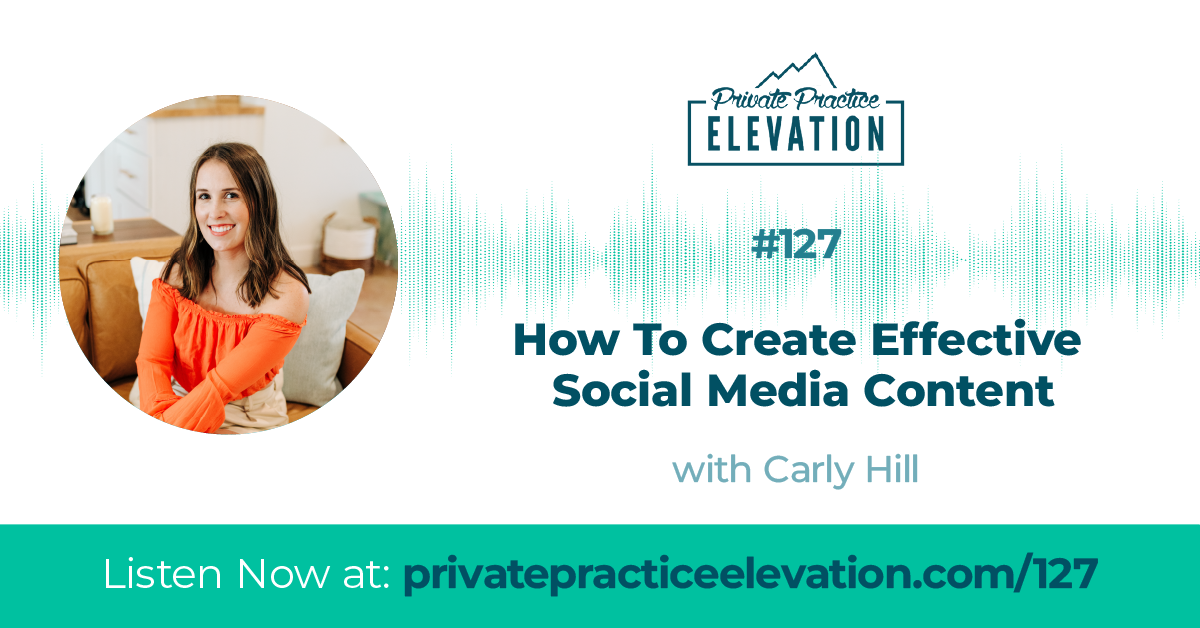In this podcast episode, you’re going to learn some of the most important aspects of creating effective social media content that will engage your ideal clients and start conversations.
Now, you may be wondering how social media marketing works when it comes to ethics…
Don’t worry, our conversation has that one covered.
But the main issue is that using social media for lead generation for therapy is ethically frowned upon.
Not so with coaching services though!
So how can you add coaching to your therapy practice and open a whole new world of potential with your social marketing – and really all your marketing?
I know from my conversations with many therapists that social media is often a love-hate relationship, with the majority of people hating it.
I myself have backed down from social media for a while due to my own fatigue and, to be honest, lack of understanding of how to make it all work.
So to help us iron this stuff out, answer the big questions about using social media ethically, and start getting results from this avenue of marketing, is our guest, Carly Hill.
I first began following Carly on Instagram because I was so impressed with her content and her consistency. I knew she was doing it well and I wanted to learn from her.
So I’m super excited to have her on the Private Practice Elevation Podcast and pick her brain.
Carly is an LCSW and business strategist for clinicians. She specializes in helping overworked and underpaid female clinicians make more money and more impact by teaching them to build the online coaching business of their dreams.
In This Episode, You’ll Learn:
- The ONE THING you need to understand in order to be successful with social media marketing
- The subtle difference between marketing/social media for a therapy practice vs a coaching business
- Using social media for lead generation for coaching vs therapy-ethics
- Why conversations are more important than likes and followers
- How to use the Pain-Agitate-Solve copywriting framework to craft any social post that will stop your ideal client in their scroll and get them to take action
- How to provide value to your audience and develop your like, know, and trust factor
- Why you shouldn’t be afraid to promote your offer and services
- How to keep things simple and just get started with social media marketing
This Episode Is Brought To You By
Subscribe & Review in Apple Podcasts
If you’re not yet subscribed to the podcast I want to encourage you to do that today. This is the best way to make sure you don’t miss an episode! Click here to subscribe on iTunes.
And if you’re feeling extra generous, I’d love to hear what you think about the podcast. Reviews help others find the podcast plus I’d really love to hear what you think! Click here to leave a review. Just click on “Ratings & Reviews” then “Write a review.” Let me know what you like best about the podcast. Thank you!
Links mentioned in this episode:
About Carly Hill
Carly Hill is an LCSW and business strategist for clinicians. She specializes in helping overworked and underpaid female clinicians make more money and more impact by teaching them to build the online coaching business of their dreams.
She helps clinicians break free out of the 1:1 model to leverage their time, get paid for their knowledge, and live a life of true freedom. She helps clinicians to find their coaching niche, develop their high ticket offer, and organically call in their ideal clients easily and effortlessly using her unique modern marketing masterplan.
How To Create Effective Social Media Content: Key Takeaways
Start with a system.
Do you have a love-hate relationship with social media marketing? It can be overwhelming, especially when we don’t have a system in place to help us manage it. Today, we’re talking with Carly Hill, an LCSW and business strategist for clinicians, about how to create effective social media content.
Carly Hill specializes in helping overworked and unpaid female clinicians make more money and more impact by teaching them to build the online coaching business of their dreams. She helps clinicians break free out of the one-to-one model to leverage their time, get paid for their knowledge, and live a life of true freedom.
Carly helps clinicians to find their coaching niche, develop their high ticket offer, and organically call in their ideal clients easily and effortlessly using her unique modern marketing master plan.
When it comes to social media, Carly recommends starting with a system. Having a system in place will make it easier to post consistently on social media. It can also help you to stay organized and make sure that you’re not overwhelmed by the task of creating content.
She suggests starting with a platform that you enjoy, like Instagram. Instagram is simpler and more fun than other platforms like Facebook. It’s also easier to manage and can help you get started on social media marketing.
Once you’ve chosen a platform, it’s important to have a system in place to help you create and post content. A system can help you stay organized and make sure that you’re consistently creating content that connects with your ideal clients. It can also help you create content that leads them to take action.
Having a system in place can make social media marketing less of a chore. When you see it working, staying motivated and creating content is easier. With a system in place, you can start to see the potential of social media and use it to reach your ideal clients.
Discern between therapy and coaching.
However, when it comes to therapy and coaching, there are some key differences that need to be taken into account. Therapy and coaching can be used together, but they are not the same. It is important to understand the differences between the two in order to use social media effectively and ethically.
Therapy is a medical treatment that is used to treat mental health disorders. It is regulated by the government and requires a license to practice. The goal of therapy is to treat a mental health disorder and help the patient manage their symptoms.
Coaching, on the other hand, is a more general approach to helping people. Coaching does not require a license and is not regulated by the government. The goal of coaching is to help people reach their goals, such as career advancement or personal development. Coaching can also be used to help people who are struggling with mental health issues, but it is not a replacement for therapy.
When it comes to social media, it is important to discern between therapy and coaching. Therapists are not allowed to use social media for lead generation purposes, as this is not ethical. However, coaches can use social media for lead-generation purposes and have engaging conversations with their followers. Coaches can also share testimonials, which is not allowed for therapists.
It is also important to note that if you have both a therapy practice and a coaching practice, and your niche is the same, you don’t need to have two separate social media accounts. You can use your coaching social media for lead generation and promotion, and if someone is interested in your coaching services, you can discern if they are a fit for your therapy practice or if they can be coached through their issue.
In conclusion, it is important to understand the differences between therapy and coaching in order to use social media effectively and ethically. Therapists must use social media for educational purposes only, while coaches can use it for lead generation purposes. If you have both a therapy practice and a coaching practice, you can use your coaching social media for lead generation and discern if someone is a fit for your therapy practice.
Know your ideal client.
When it comes to social media, it is important to know your ideal client. You need to understand their pain points and what their living hell is, as well as what their heaven is. Knowing your ideal client allows you to create compelling hooks that will stop the scroll and grab their attention. You also need to be speaking to them in their language and not using clinical jargon. Finally, you need to have clear and concise call to actions that direct them to the next step.
It is also important to assign value to what you are offering. Invite your ideal client to a free training or a free Facebook group as if you are inviting them to a dinner party. This will help build trust and show them that you understand their needs.
Overall, it is essential to know your ideal client when it comes to using social media. Knowing their needs, pain points, and language will help you create effective posts that will capture their attention and lead them to the next step.
Be consistent and inviting.
Consistency is key when it comes to social media marketing. You have to be present and be seen in order to get noticed. This means posting regularly and creating content that your ideal client can relate to. You want to create a presence on social media that will capture your audience’s attention and make them want to engage with you.
It is also important to be inviting and engaging. You want to make sure that your audience knows that you are here to help them and that you understand their pain points. Start off by calling out to your ideal population and their pain, and then agitate their pain and let them know that there is a solution. Invite them to take the next step, whether it be a free guide, a training, or a call. This will help move them along in the journey and create a relationship with them.
Finally, don’t be afraid to put yourself out there. You have to invite people to take that next step and create these posts. It can be intimidating, but it is important to be seen and be heard in order to be successful. Start with something simple and ease into your voice and your face.
Overall, being consistent and inviting are important when it comes to using social media. Knowing your ideal client and creating content that speaks to them will help you create relationships and move them along in their journey. Don’t be afraid to put yourself out there and invite people to take the next step.
Promote yourself and your offer.
When it comes to creating content, having a system is key. This system should involve figuring out who your ideal client is and talking to their pain and their “heaven”. Break these topics down into five different buckets, such as burnout, energizing, mom guilt, etc. Plug these topics into copywriting frameworks or create a calendar to keep yourself organized. On Mondays, you can promote yourself and invite people to free trainings, on Tuesdays ask them what they want you to teach on, Wednesdays do free training, Thursdays do a PAS post, Fridays talk about fun facts about you behind the scenes. This will help you batch your content and save time.
Reusing content is also important. If you are talking about burnout on your blogs for one week, you can hyperlink the posts you did on Instagram and your blog about burnout. This will also save you time.
Don’t be afraid to share your offer. You are using social media to convert and get a paying client. Invite them to take the next step and let them know what you have to offer. It can be uncomfortable to promote yourself, but you are doing a disservice if you don’t share what you have to offer. Give them permission to raise their hand and let them know that it is okay to promote yourself and share your offer.
Connect with ideal clients.
It is important to connect with your ideal clients on social media. You can use social media to reach a wider audience and to help your ideal clients find you. You can also use social media to create conversations, generate leads, and educate your ideal clients on the value of your services. You can share stories about how you have helped your clients and to showcase what you have to offer.
When you are creating content for social media, think about what your ideal clients need to know. What do they need to understand about your services and how you can help them? What kind of stories can you tell that will help them understand the value of working with you? Share tips and resources that will help them solve their problems.
When you are creating content, remember to be authentic and relatable. Make sure that you are using language that your ideal clients understand. Speak to them in a way that will make them feel comfortable and connected to you.
It is also important to be consistent with your content. Post regularly and create a schedule for yourself. You want to make sure that you are putting out content that is helpful to your ideal clients and that you are keeping them engaged.
By connecting with your ideal clients on social media, you can help them understand the value of working with you and you can create relationships with them.
You can use social media to create conversations, generate leads, and educate your ideal clients on the value of your services. By being consistent with your content and being authentic, you can create relationships and help your ideal clients find you.


